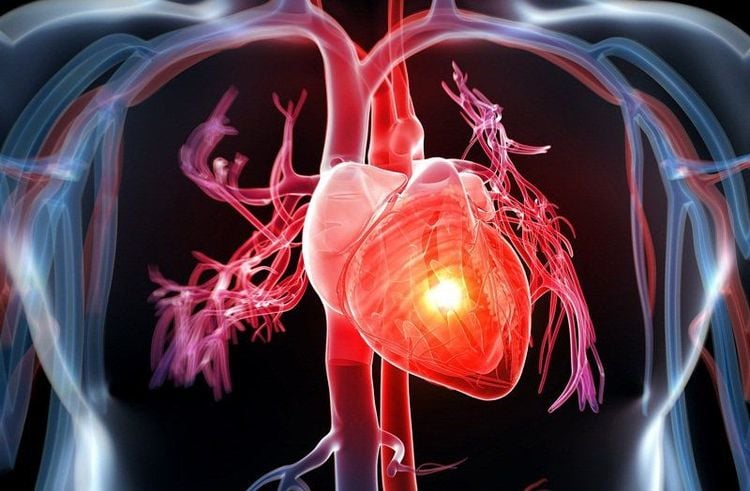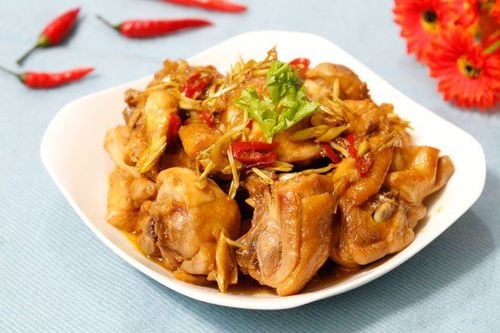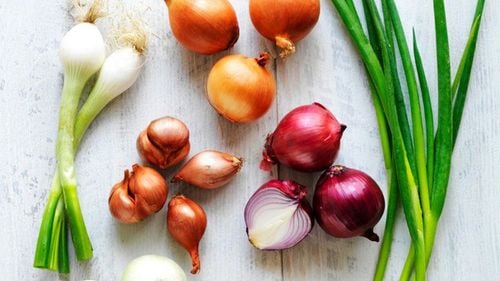This is an automatically translated article.
Chives are a small, elongated onion with a flavor often described as a delicate blend of traditional onion and garlic. Shallots grow in clusters, contain less water, and have thinner skins than traditional onions, but they can also bring tears to your eyes. Chives are a rich source of nutrients and plant compounds that offer many health benefits.
1. Origin and nutrition of chives
Chives belong to the Allium family, the same family as other spices such as leeks, green onions, garlic, onions, and white onions.
Although the outer skin of chives is similar in color and shape to a red onion, their insides are very different. Inside the outer skin, chives have 3 to 6 small cloves like garlic, instead of a complete mass like an onion.
With 100 grams equivalent to 10 tablespoons chopped chives can provide:
Calories: 75 Protein: 2.5 grams Fat: 0 grams Starch: 17 grams Fiber: 3 grams Calcium: 3% Daily Value ( DV) Iron: 7% DV Magnesium: 5% DV Phosphorus: 5% DV Potassium: 7% DV Zinc: 4% DV Folate: 9% DV Compared to regular onions, chives are a great source of protein, fiber and micronutrients more concentrated nutrients, including calcium, iron, magnesium, phosphorus, potassium, zinc, copper, folate, B vitamins and vitamins A and C.

Trong cây hẹ chứa rất nhiều dưỡng chất tốt cho sức khỏe
2. Health benefits of chives
2.1 High amount of antioxidants Antioxidants are compounds that help protect cells from damage by substances called free radicals. Too many free radicals in the body can cause oxygen stress that leads to inflammation, as well as chronic diseases like cancer, heart disease, and diabetes. Chives are rich in compounds with antioxidant activity, such as quercetin, kaempferol, and allicin.
A study that analyzed the antioxidant activity of 11 popular onion varieties found that chives contained the highest amounts. In another study comparing the antioxidant power of six plants of the Allium family, chives were found to be the 2nd strongest.
2.2 Reducing allergic complications During an allergic disease, the body's cells release histamine, which causes symptoms such as swelling, watery eyes, and itching. Chives are high in quercetin, a plant compound that helps control eye and nose related ailments. Quercetin may act as a natural antihistamine by blocking the release of histamine and reducing the severity of reactions such as respiratory tract infections, allergic asthma, bronchitis, and allergic reactions. season. In fact, quercetin is a key ingredient in many allergy medications and other dietary supplements.

Hẹ giúp làm giảm mức độ nghiêm trọng của bệnh viêm đường hô hấp
2.3 Antimicrobial Effects A large study found that the organosulfur compounds in chives have antibacterial, antifungal, and viral properties. Plants of the Allium family have long been used in Traditional Chinese Medicine to help treat colds, fevers and coughs, as well as flu.
A 4-week study in 16 adults with seasonal allergies observed that taking 200 mcg/ml of chives extract daily reduced symptoms in 62.5% of study participants. Another study in 60 people found that using a 0.5% chive extract solution hourly helped ulcers heal significantly faster. The sores healed within 6 hours for 30% of the participants, 24 hours for the rest who used chives. This result was significantly faster than in the placebo group, which took up to 48 to 72 hours for recovery.
Furthermore, a 15-second gargle with chives extract and water has been shown to be more effective than chlorhexidine, a medical antiseptic that is said to inhibit bacteria in the mouth to 24 hours.
2.4 Support Heart and Circulatory System Research indicates that the organosulfur compounds and antioxidants in chives may benefit heart health and blood circulation, reducing the risk of heart disease.

Hẹ giúp làm giảm nguy cơ mắc bệnh tim mạch
Chives contain large amounts of thiosulfate, a type of organosulfur compound that can prevent the formation of blood clots. Similarly, Allicin, another organosulfur compound in chives, has been shown to reduce blood vessel stiffness by releasing nitric oxide, improving circulation and lowering blood pressure. Thereby improving cholesterol levels in the body. A comparative study of 11 plants of the Allium family found that chives and garlic had the greatest blood clot prevention activity, attributed to their quercetin and allicin content.
A study in rats determined that daily allicin supplementation reduced cholesterol and triglyceride levels, helping to protect against atherosclerosis - the buildup of plaque in the arteries that can lead to disease heart.
2.5 Other Benefits The powerful compounds in chives provide a number of other health benefits such as:
Weight maintenance: some studies indicate that compounds in chives can help prevent buildup accumulate excess fat and maintain a lower total body fat percentage. Stabilizes blood sugar: The plant compounds in chives can help lower blood sugar levels. A number of experimental studies in rats have produced this positive result.

Hẹ giúp làm giảm lượng đường trong máu
3. How to add chives to your diet
The delicate taste of chives is favored in many recipes.
Some popular ways to eat chives include:
Grilling chives with other vegetables, tofu or meat Chopping chives and adding them to stir-fries and soups Dicing and sprinkling chives on top of salads, bruschetta or pasta Spread chives on top of homemade pizzas Chop and add chives to sauces or sauces
4. Alternatives to chives
If chives are not readily available in the kitchen, the best alternative is regular onion plus a pinch of minced or dried garlic, because chives and onions traditionally provide different flavors. This substitution works best when the recipe calls for cooked chives, as raw onions and chives often have fairly distinguishable flavors.
On the other hand, when substituting shallots for an entire onion, users should use three shallots for each onion in recipes. The number of shallots and the number of shallots in the recipe are often confused with each other, so it is important to confirm the recipe before cooking.
Please dial HOTLINE for more information or register for an appointment HERE. Download MyVinmec app to make appointments faster and to manage your bookings easily.
Reference article: Healthline.com












